When you're fighting a cold, healing herbal tea blends can be your best ally. Consider a ginger-lemon tea that soothes your throat while providing immune support. Peppermint acts as a natural decongestant, helping you breathe easier. You might also enjoy a chamomile-mint blend for relaxation and symptom relief. If you're craving something spicy, try turmeric and cinnamon tea for its anti-inflammatory benefits. Don't forget to use fresh water and steep your herbs correctly to get the most flavor. There are plenty more tips and recipes that can enhance your wellness journey.
Benefits of Herbal Tea
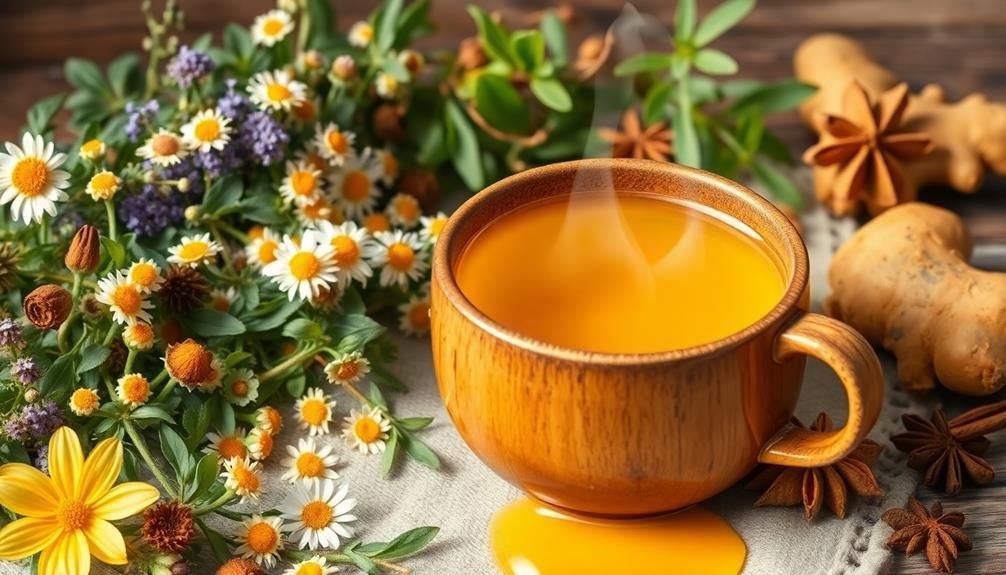
Herbal tea offers a treasure trove of benefits that can enhance your overall well-being. When you sip on a warm cup, you're not just enjoying a comforting beverage; you're also accessing a variety of health advantages.
For starters, herbal teas can be incredibly soothing. They help you relax, reduce stress, and promote better sleep, making them an excellent choice for winding down after a long day.
You'll also find that many herbal teas are packed with antioxidants, which help combat oxidative stress in your body. This means they may support your immune system, helping you fend off illnesses, especially during cold and flu season.
Additionally, certain herbal blends can aid digestion, alleviating discomfort and promoting gut health.
Moreover, herbal teas can help keep you hydrated, which is essential for maintaining overall health. When you choose herbal over sugary drinks, you're making a positive choice for your body.
Key Ingredients for Healing
Many healing herbal tea blends feature a few key ingredients that can greatly boost your health. One of the most popular is ginger. Its warming properties help stimulate circulation and may alleviate cold symptoms.
Plus, ginger's anti-inflammatory effects can soothe a sore throat and reduce congestion.
Another essential ingredient is echinacea. Known for its immune-boosting capabilities, echinacea can help your body fight off infections more effectively.
You might find it particularly useful when you feel a cold coming on.
Peppermint is also a fantastic addition. It contains menthol, which acts as a natural decongestant, helping to clear your sinuses and ease breathing.
Plus, its invigorating flavor can make your tea more enjoyable.
Don't overlook honey, either. While not an herb, it's often added for its soothing properties.
Honey can help coat your throat and relieve irritation, making it a perfect companion in your herbal tea blend.
Lastly, lemon provides a burst of vitamin C, essential for immune function.
Together, these ingredients create a powerful, healing blend that not only tastes great but also supports your body during cold season.
Popular Herbal Tea Recipes
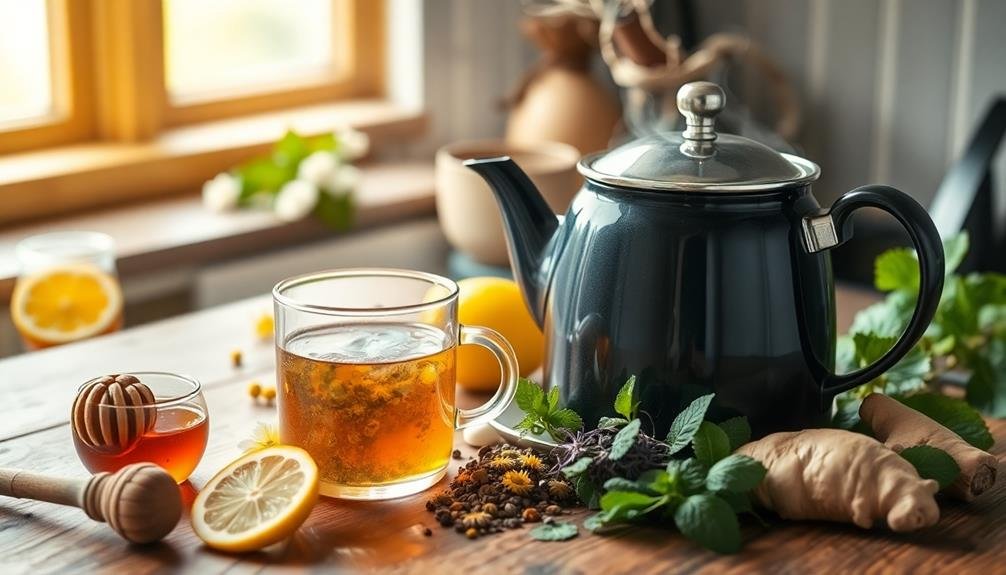
If you're looking to harness the benefits of those key ingredients, you can easily whip up some popular herbal tea recipes at home.
One great option is a ginger-lemon tea. Just steep fresh ginger slices in hot water, then add a squeeze of lemon juice and a bit of honey for sweetness. This combination not only tastes invigorating but also helps soothe your throat.
Another favorite is a chamomile-mint blend. Combine dried chamomile flowers with a handful of fresh mint leaves, and steep them together. This tea promotes relaxation and may help ease cold symptoms.
For a spicy kick, try a turmeric and cinnamon tea. Boil water with a teaspoon of turmeric and a cinnamon stick, then strain and enjoy. This blend packs an anti-inflammatory punch.
If you're after something fruity, consider a hibiscus-rosehip tea. Steep dried hibiscus petals and rose hips for a tart, vitamin C-rich drink.
Finally, don't overlook a classic peppermint tea—just steep fresh or dried peppermint leaves in hot water for an invigorating and soothing beverage that can clear congestion.
With these recipes, you'll be well on your way to feeling better in no time!
Brewing Techniques for Maximum Flavor
Revealing the full flavor potential of your herbal teas requires a few essential brewing techniques.
First, always start with fresh, cold water. The quality of your water directly impacts the taste of your tea. Heat the water to the appropriate temperature; most herbal teas benefit from boiling water, around 200°F (93°C).
Next, measure your herbs correctly. A general rule is to use one teaspoon of dried herbs or one tablespoon of fresh herbs for every cup of water. If you want a more robust flavor, don't hesitate to increase the amount slightly.
Once your water reaches the right temperature, pour it over the herbs and let them steep. Most herbal teas need a longer steeping time, typically 5 to 15 minutes, depending on the blend. Use a timer to avoid bitterness.
Storage Tips for Freshness
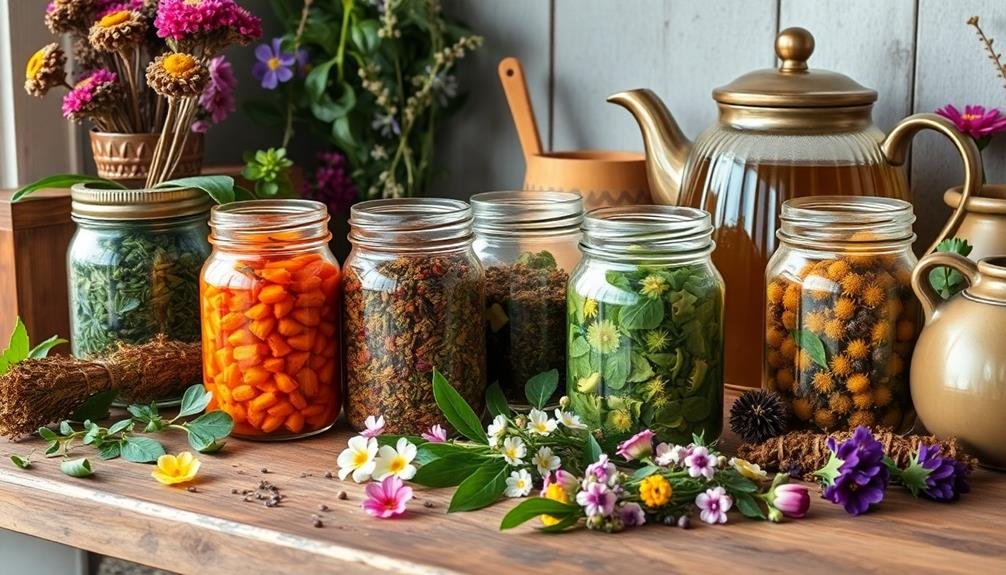
To enjoy the vibrant flavors and health benefits of your herbal teas, proper storage is key. Start by selecting an airtight container, like a glass jar or a tin, to keep moisture out.
Light and air can degrade the quality of your herbs, so store your container in a cool, dark place, away from direct sunlight and heat sources.
Make sure to label your containers with the tea type and date of purchase. This way, you'll know what you have and when it's best to use it. Herbal teas generally maintain their freshness for about six months to a year, depending on the ingredients. If you notice any off smells or changes in color, it's time to toss them.
For loose leaf teas, avoid using plastic bags, as they can trap moisture. Instead, opt for containers that allow for minimal air exchange.
If you've mixed your herbs into a blend, keep them separate until you're ready to brew. This method helps preserve the individual flavors and benefits of each herb.
Frequently Asked Questions
Can Children Safely Drink Herbal Tea During a Cold?
Yes, children can safely drink herbal tea during a cold, but it's important to choose caffeine-free options and consult a pediatrician first. Always monitor for any allergic reactions, especially with new herbal blends.
Are There Any Side Effects of Herbal Tea for Colds?
Herbal teas can cause side effects like allergies, digestive issues, or interactions with medications. You should pay attention to how your body reacts and consult a healthcare professional if you experience any adverse effects.
How Often Should I Drink Herbal Tea When Sick?
When you're feeling under the weather, drink herbal tea three to four times daily. This not only keeps you hydrated but also helps soothe your throat and supports your immune system during recovery.
Can I Mix Different Herbal Teas Together?
Yes, you can mix different herbal teas together! Experiment with flavors and benefits that appeal to you. Just make sure the herbs complement each other and don't cause any potential interactions or side effects. Enjoy your blend!
Is It Safe to Drink Herbal Tea While Pregnant?
While you're pregnant, it's essential to choose herbal teas carefully. Some herbs can be unsafe. Always check with your healthcare provider before drinking any herbal tea to guarantee it's safe for you and your baby.
In Summary
Incorporating healing herbal tea blends into your routine can be a comforting way to combat colds. With their numerous benefits and key ingredients, you can easily brew delicious recipes that provide warmth and relief. By following proper brewing techniques and storage tips, you'll guarantee your tea stays fresh and flavorful. So, the next time you feel under the weather, reach for a cup of herbal tea—you'll not only soothe your symptoms but also enjoy a moment of self-care.

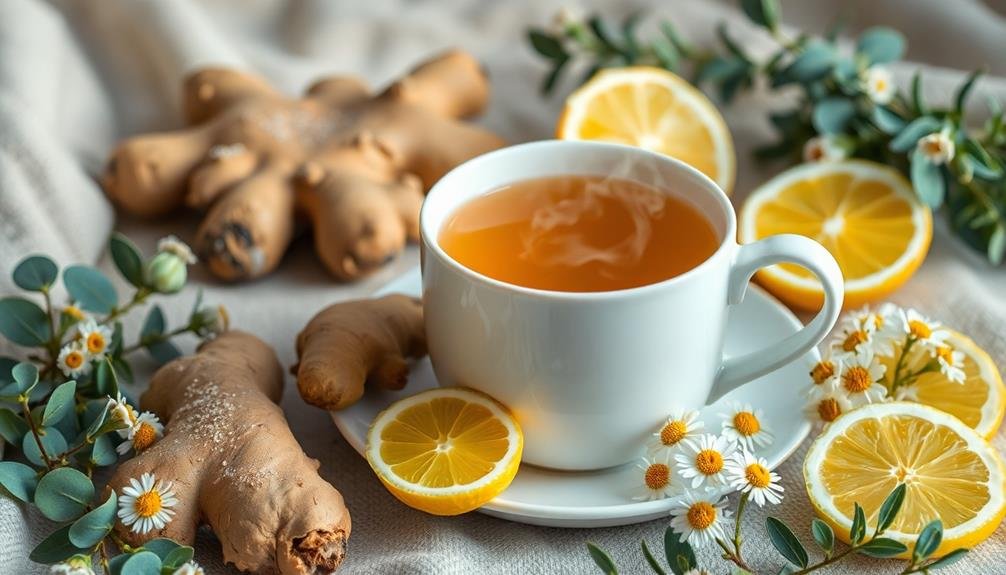
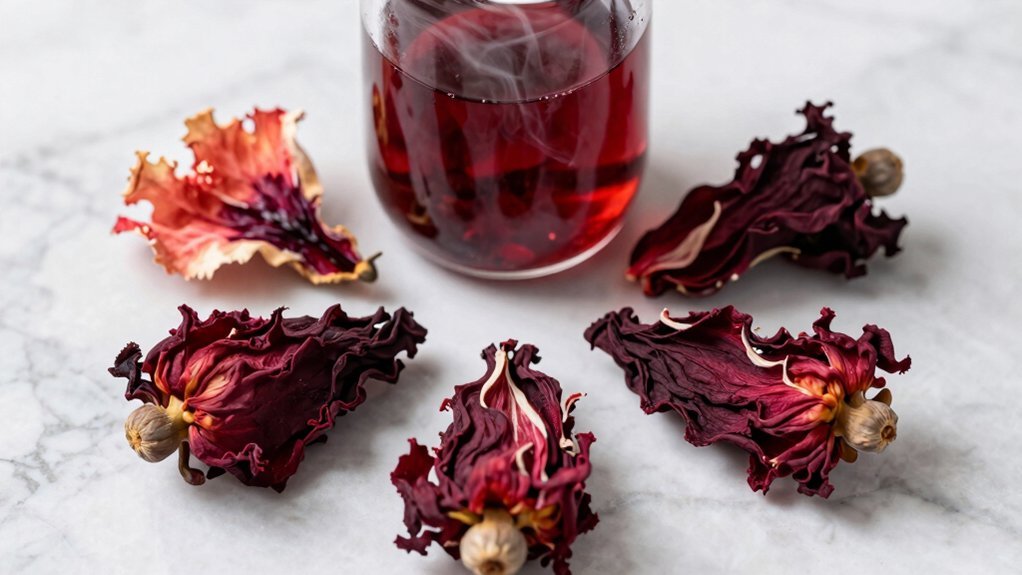


Leave a Reply